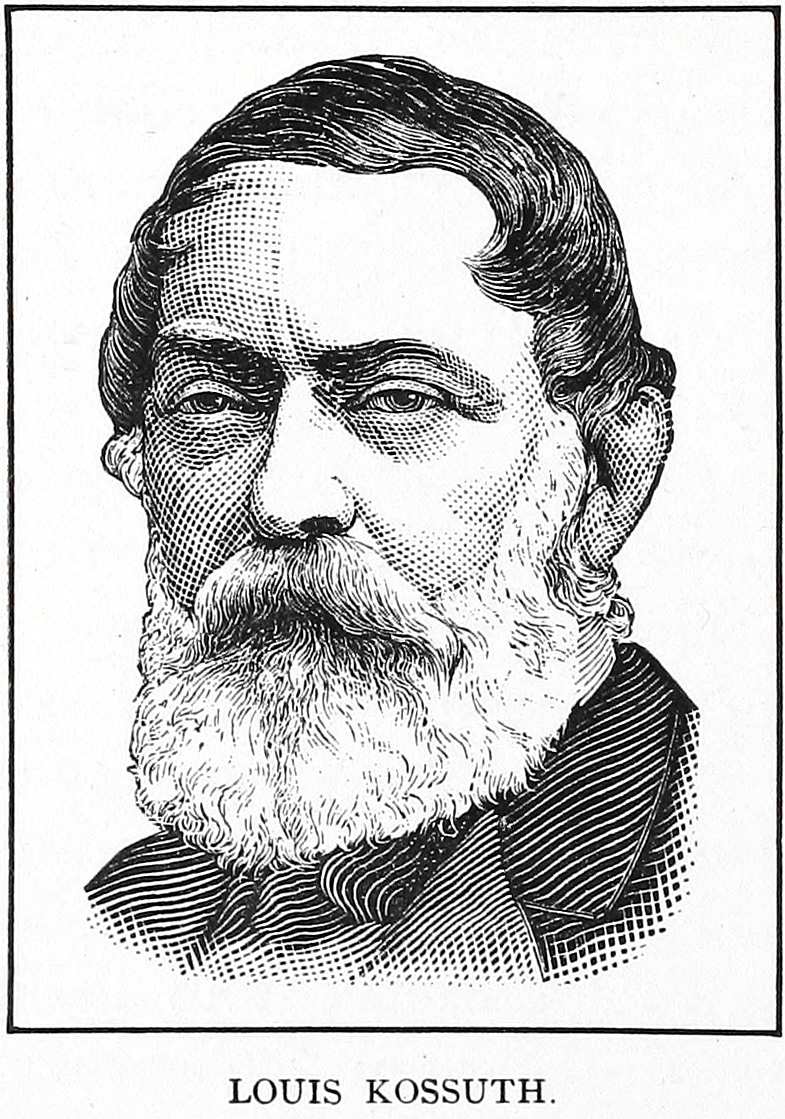Perley's Reminiscences
by Benjamin Perley Poore, 1886.
Louis Kossuth

by Benjamin Perley Poore, 1886.
Louis Kossuth

Meanwhile, Kossuth had been released from his imprisonment within the dominion of the Sublime Porte, by request of the Government of the United States, and taken to England in the war steamer Mississippi. In due time the great Behemoth of the Magyar race arrived at Washington, where he created a marked sensation. The distinguished revolutionist wore a military uniform, and the steel scabbard of his sword trailed on the ground as he walked. He was about five feet eight inches in height, with a slight and apparently not strongly built frame, and was a little round-shouldered. His face was rather oval; a pair of bluish-gray eyes gave an animated and intelligent look to his countenance. His fore-head, high and broad, was deeply wrinkled, and time had just begun to grizzle a head of dark, straight hair, a heavy moustache, and whiskers which formed a beard beneath his chin. Whether from his recent captivity or from constitutional causes, there was an air of lassitude in his look to which the fatigues of his voyage not improbably contributed. Altogether, he gave one the idea of a visionary or theoretical enthusiast rather than of a great leader or a soldier.
Kossuth was the guest of Congress at Brown's Hotel, but those Senators and Representatives who called to pay their respects found members of his retinue on guard before the door of his apartments, armed with muskets and bayonets, while his ante-room was crowded with the members of his staff. They had evidently been reared in camps, as they caroused all day and then tumbled into their beds booted and spurred, furnishing items of liquors, wines, cigars, and damaged furniture for the long and large hotel bill which Congress had to pay. Mr. Seward entertained the Hungarian party at an evening reception, and a number of Congressmen gave Kossuth a subscription dinner at the National Hotel, at which several of the known aspirants for the Presidency spoke. Mr. Webster was, as became the Secretary of State, carefully guarded in his remarks, and later in the evening, when the champagne had flowed freely, he indulged in what appeared to be his impromptu individual opinions, but he unluckily dropped at his seat a slip of paper on which his gushing sentences had been carefully written out. General Houston managed to leave the table in time to avoid being called upon to speak, and General Scott, who regarded Kossuth as a gigantic humbug, had escaped to Richmond. Kossuth was invited to dine at the White House, and on New Year's day he held a reception, but he failed in his attempt to secure Congressional recognition or material aid.
A number of the leading public men at Washington were so disgusted by the assumption and arrogance displayed by Kossuth, and by the toadyism manifested by many of those who humbled themselves before him, that they organized a banquet, at which Senator Crittenden was the principal speaker. “Beware,” said the eloquent Kentuckian, in the words of Washington “of the introduction or exercise of a foreign influence among you! We are Americans! The Father of our Country has taught us, and we have learned, to govern ourselves. If the rest of the world have not learned that lesson, how shall they teach us? We are the teachers, and yet they appear here with a new exposition of Washington's Farewell Address. For one, I do not want this new doctrine. I want to stand super antiquas vias — upon the old road that Washington traveled, and that every President from Washington to Fillmore has traveled.”The main effect of Kossuth's visit to the United States was an extraordinary impetus given to “The Order of United Americans,” from which was evolved that political phenomenon, the American, or Know-Nothing, party. The mysterious movements of this organization attracted the curiosity of the people, and members of the old political organizations eagerly desired to learn what was carefully concealed. Secretly-held lodges, with their paraphernalia, pass-words, and degrees, grips and signs, tickled the popular fancy, and the new organization became formidable. Men of all religions and political creeds fraternized beneath the “stars and stripes,” and solemnly pledged themselves to the support of “our country, our whole country, and nothing but our country.”
Perley's Reminiscences of Sixty Years in the National Metropolis by Benjamin Perley Poore, 1886, page 403-406.